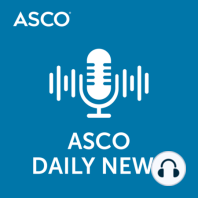25 min listen
DESTINY-Breast04 and Other Key Breast Cancer Studies at ASCO22
FromASCO Daily News
ratings:
Length:
31 minutes
Released:
Jun 21, 2022
Format:
Podcast episode
Description
Dr. Allison Zibelli, of the Sidney Kimmel Cancer Center – Jefferson Health, and Dr. Hope Rugo, of the Helen Diller Family Comprehensive Cancer Center at the University of California, San Francisco, discuss the practice-changing DESTINY-Breast04 trial as well as novel therapies in metastatic HR+/HER2- breast cancer from the TROPiCS-02 and MAINTAIN studies, all of which were featured at the 2022 ASCO Annual Meeting. TRANSCRIPT Dr. Allison Zibelli: Hello. I’m Dr. Allison Zibelli, your host for the ASCO Daily News Podcast today. I’m a vice-chair and breast medical oncologist at the Sidney Kimmel Cancer Center, Jefferson Health in Philadelphia. My guest today is Dr. Hope Rugo, a professor of medicine and the director of Breast Oncology and Clinical Trials Education at the Helen Diller Family Comprehensive Cancer Center at the University of California, San Francisco. We’ll be discussing key advances in breast cancer that were featured at the 2022 ASCO Annual Meeting. Our full disclosures are available in the show notes, and disclosures of all guests on the podcasts can be found on our transcripts at asco.org/podcasts. Hope, it’s great to talk to you today. Dr. Hope Rugo: Nice to talk to you, too. Dr. Allison Zibelli: Let’s begin with perhaps the most exciting abstract at ASCO this year, which was the DESTINY-Breast04 study, that’s LBA3, a randomized phase 3 study of trastuzumab deruxtecan versus treatment of physician’s choice in patients with HER2-low, unresectable and/or metastatic breast cancer. What are your thoughts about this study? Dr. Hope Rugo: Well, of course, this is a hugely practice-changing study as was noted in the second-to-last slide by the discussant [Dr.] Pat LoRusso. So, antibody-drug conjugates are really the next step in delivering chemotherapy to cancer cells. The antibody-drug conjugates allow targeted delivery of a toxin to the cancer cell. I think we didn’t understand how important this was going to be. These second, sort of, verging on third-generation antibody-drug conjugates use an antibody approach and to then have a new generation of linkers, which allow the drug to be released locally, but to then have drugs which pack a big bang for the buck. So, the way antibody-drug conjugates are constructed, you need to have a drug that actually can’t be given as a naked drug because it’s too toxic because you’re giving just very small amounts of this drug that are delivered directly to the cancer cell. And the other really critical part of this is that the drug-to-antibody ratio of at least the successful and new antibody-drug conjugates (ADC) is quite high in the 7.5 to 8 toxins per antibody. Now, what that’s resulted in is really interesting, is that there’s a bystander effect. So, the toxin itself can leak out of the cancer cell that it’s targeted and kill neighboring cells, but also because of the construct of these antibody-drug conjugates, what’s likely happening is even if the cancer cell’s a very low expression of the target, really low, you’re able to actually get that ADC into the cancer cell to kill the cancer cell. So that may be a big part of the so-called bystander effect. So trastuzumab deruxtecan is biosimilar trastuzumab linked to a topoisomerase inhibitor deruxtecan, and what happened here was that of course, we saw remarkable data in HER2+ disease, unbelievable p-values in DESTINY-Breast03 compared to T-DM1, a first-generation ADC. But in DESTINY-Breast04, we targeted a population of patients largely with hormone receptor-positive disease who had a little expression of HER2, 1 plus or 2 plus by immunohistochemistry and no gene amplification. And this trial, which randomly assigned patients 2:1 and included just 58 patients with triple-negative disease. So in this trial, 480 had hormone receptor-positive breast cancer, a median of 1 line of prior chemotherapy. They were only allowed up to 2. They were refractory to endocrine therapy, a median of 3 lines of endocrine therapy. In the overall p
Released:
Jun 21, 2022
Format:
Podcast episode
Titles in the series (100)
Dr. Derek Raghavan Has a Remedy to Mitigate Financial Toxicity in Cancer Treatment: Transcript: Dr. John Sweetenham: Hello, I'm John Sweetenham, Associate Director of Clinical Affairs at UT Southwestern's Harold C. Simmons Comprehensive Cancer Center, and the guest host of ASCO Daily News Podcast today. I'm joined by my friend and... by ASCO Daily News
